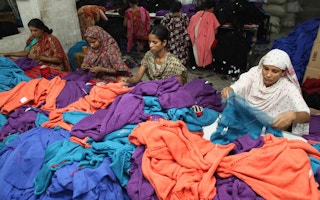Slavery is outlawed in every country in the world. It is universally abhorred. Yet more people are enslaved today than when slavery was legal.Why? Because, today, the millions of men, women and children who are exploited, abused, denied basic human rights and deprived of their dignity have no chains. They are the silent victims of a toxic economy driven by a global thirst for cheap goods and services.
More than 40 million people are currently enslaved. Of this number, 70 per cent are trapped in forced labour, working unpaid in factories, risking their lives on fishing boats, dying as children in dilapidated mines and hidden so far down the supply chains of multinational companies that it is almost impossible to trace them. Yet there they are, locked in debt bondage or working for nothing, all in the desperate attempt to pay their masters back for the privilege of giving them work.
These are today’s forgotten people: unseen, unheard and unprotected. Stripped of their humanity, they have become commodities, locked in a cycle of exploitation and deprivation while the appetite for cheaper clothes, affordable phones and mass-produced food continues to grow.
It is hard to deny the moral imperative for businesses to take the lead in fighting this shameful global crime. But if the moral argument alone isn’t enough, board members, shareholders and investors alike might like to know that fighting slavery also offers attractive economic returns.
Slavery is a multi-faceted crime. It flourishes where corruption is widespread, where there is impunity, where people are poor and vulnerable, where girls don’t go to school, where kids don’t have a future and are at risk of being radicalised. When you fight slavery, you fight all of that.
And change is happening.
Let’s start with media scrutiny. You only have to look at what happened following the collapse of the Rana Plaza factory in Bangladesh in 2013, when 1,134 workers lost their lives and 2,500 were injured. Suddenly, slavery found itself in the headlines and some of the biggest businesses in the world responded, pledging to work together to improve working conditions and monitor progress. Businesses care about consumer perception, and increased media scrutiny has led to public awareness – though, this alone doesn’t necessarily translate into changed spending habits.
The second factor clearly leading to progress is the introduction of new legislation. The UK Modern Slavery Act 2015 has developed a standard for corporates to adhere to. The act requires companies with a turnover of more than £36 million to publish a public statement about what they are doing – if anything – to address slavery in the supply chain. It’s a beginning; more remains to be done. Recent evidence suggests that many businesses – more than one in three – are ignoring this legislation, without penalty.
In February 2017, the French Parliament adopted a similar law. The Duty of Vigilance legislation does not focus on the level of profit, instead, it looks at the size of companies. Only 150 businesses will be affected by the new rules, which lay out specific reporting requirements.
The Dutch government is currently considering legislation that would require companies to publicly report on whether child labour is present in their supply chains and the steps taken to eradicate it. Failure to comply would result in significant consequences.
Most recently, in Australia, there is an ongoing consultation for the establishment of an anti-slavery bill. A report was published in August 2017 in support of enacting a law that would force companies with a turnover of more than $100 million to publicly file a modern slavery report every year. Recommendations are for a law to go further than current UK legislation, particularly in setting out what the report must contain and the consequences should businesses refuse to comply.
But more laws won’t put an end to slavery. The problem with laws is that they have to be implemented. So the change in attitude has to come from big business themselves, and it has to come from the top. It’s always more efficient if it comes from CEOs who can lead the way in supply chain transparency and management. Every tier of their businesses will follow suit.
Here, certain global corporations are setting the bar high. Apple, for example, has established a supplier’s code of conduct and spent significant resources to assess the risk of forced labour at all levels of its supply chain. This has triggered hundreds of in-depth investigations, some lasting weeks. Apple educates its suppliers about responsible business and has trained 11.5 million workers in their native languages to understand their rights, to recognise if and when these are being abused, and how to take action.
Meanwhile, Adidas, which employs 1.3 million workers and won the Thomson Reuters Foundation’s Stop Slavery Award in 2017, has established strict responsible sourcing guidelines tracing risks of forced labour right down to the raw materials used in its supply chains. This is exceptionally hard to do. The company has also established worker hotlines across Southeast Asia allowing people to anonymously report concerns.
Real impact, however, comes from cross-sector collaboration and shared expertise, with businesses, government and civil society working together. We are already seeing this happen – with different corporations in the same sector sharing best practice and collaborating with NGOs that are specialists in the fight against slavery.
Walmart, for example, a company that employs 2.3 million people and has a revenue of $485.9 billion, is using such a collaborative approach to address illegal, unreported and unregulated fishing in Thailand. It is working with other retailers, suppliers, processors and NGOs to identify risks of forced labour and to train its seafood suppliers in Thailand on supply chain visibility and management systems. It has also established a task force to develop a workforce code of conduct and carries out regular auditing and vessel monitoring. This requires a close relationship with local experts on the frontline.
“
Millions of men, women and children who are exploited, abused, denied basic human rights and deprived of their dignity have no chains. They are the silent victims of a toxic economy driven by a global thirst for cheap goods and services.
Meanwhile, the Responsible Business Alliance, a coalition of businesses working in the electronics industry, has committed to supporting the rights of workers and communities linked to their supply chains. And the Better Cotton Initiative, a global cotton sustainability programme, is uniting everyone from farmers to fashion brands in raising the standards of global cotton production. The goal is to improve working conditions, have a lower environmental impact, and overall, strengthen the sector’s competitiveness.
As a very recent example, global brands such as Unilever and Sainsbury’s have partnered with leading financial firms to offer financial incentives to Malawian tea farmers in exchange for data-backed evidence of more transparent and sustainable farming practices being adopted in their supply chains.
There is no doubt that combining forces is necessary to tackle slavery and forced labour given the vast, complex and multi-layered nature of global supply chains. It is only through sharing data and forging cross-sector alliances that we can develop best practice and close the existing loopholes that keep forced labour alive.
Engaging big businesses is a necessary step in the efforts to crush modern slavery, but without the serious risk of reputational damage, increased regulation and continued media attention, there’s a danger that some businesses will lack the courage or incentive to address the issue. That’s why the fight against slavery must be a priority for all of us.
Monique Villa is CEO of the Thomson Reuters Foundation and Founder of TrustLaw and Trust Women. This story was published with permission from Thomson Reuters Foundation, the charitable arm of Thomson Reuters, that covers humanitarian news, women’s rights, corruption and climate change. Visit news.trust.org











